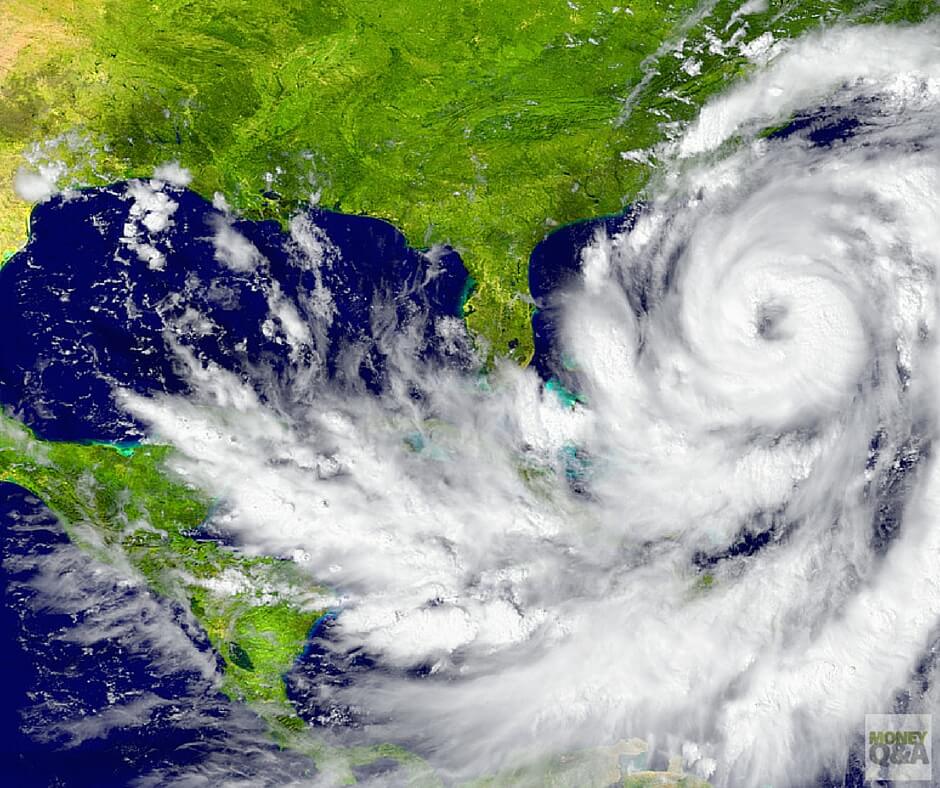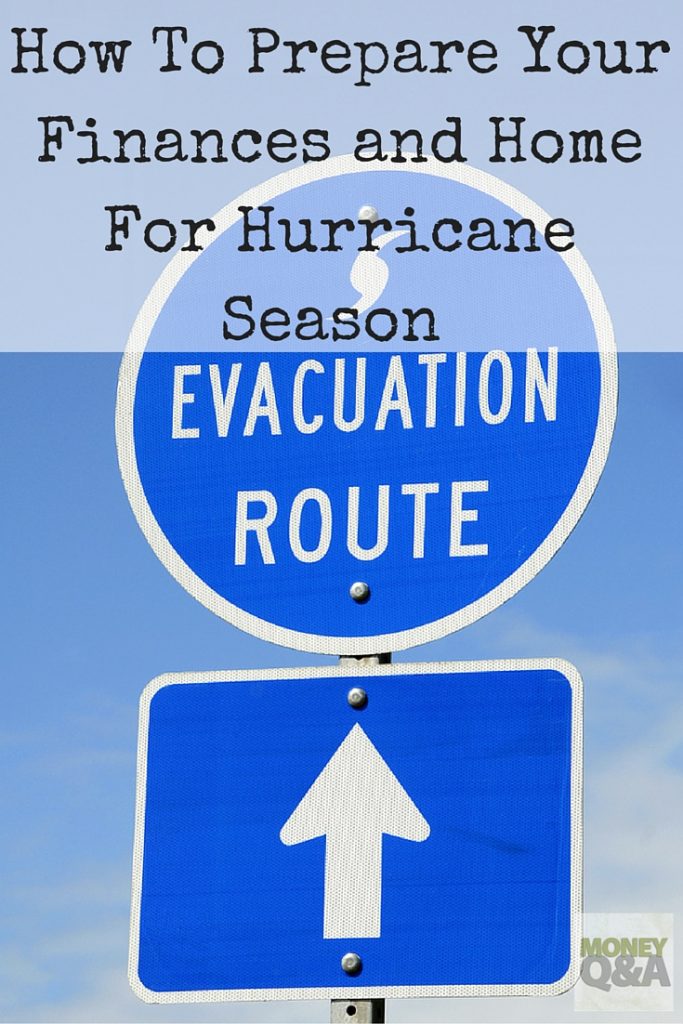The Atlantic hurricane season runs from June through November. August and September see the worst of hurricane season. According to the Weather Channel, August sees more than three times the number of storms as July, and it keeps building in September.

September is the peak time of the year for hurricane season in the United States. And, most insurance companies require you to have homeowner’s, renter’s, or flood insurance for at least 30 days before your coverage kicks in and you can make a claim. So, now is the time to look at your home and insurance and prepare your finances for hurricane season.
I grew up in Charleston, South Carolina. I lived through Hurricane Hugo in 1989 that ripped through my beloved hometown. My family and I were very lucky. Other than having to replace the shingles on the roof of our house, we escaped fairly unscathed. We definitely fared better than others did that September in 1989.
My mother doesn’t play around with hurricanes. We always ran, and we ran early. We never waited until the order to evacuate was given. My family simply drove three hours north to my grandparents’ house.
We were prepared. My family had a plan. We had supplies and family support. And, we had the right insurance coverage.
The 2017 Atlantic hurricane season predictions call for 11 named storms – four hurricanes, two of which are estimated to be major ones. While a slower season is expected, there is an increase in historic-level storms, floods, and fires that cause massive devastation. Hurricanes activity is up 80% since 1980.
The increased activity is one of the main reasons why a preparedness plan has become so essential. But, so many don’t take the time to put together a thorough plan that protects their family.
Hurricanes are unpredictable. You need to have your finances in order as the heart of hurricane season approaches in September. Now is the time to prepare your finances for the hurricane season.
Preparing Your Finances For Hurricane Season
Review Your Homeowner’s Insurance Policy
Do you have the right homeowner’s insurance policy? Do you need flood insurance?
A new ValuePenguin.com survey which found that 1 in 2 homeowners are completely ignorant of the property damage costs of hurricanes. 52% of the homeowners we surveyed guessed that repairs will cost less than $10,000 after a hurricane. This figure is several times smaller than the average claim filed during recent hurricanes, which ranged from $30,000 (Hurricane Irene) to over $100,000 (Hurricane Harvey). More worryingly, 45% of homeowners said they didn’t know how much hurricane-related insurance they would need in order to be protected against the financial fallout of a hurricane.
43% of respondents who live in high-risk states believe that weather professionals exaggerate the risk of hurricanes. A further 56% of the surveyed homeowners said they were reluctant to evacuate their homes, and would only leave if evacuation were mandatory (as opposed to recommended). Most worryingly, 1 in 10 homeowners said they would not evacuate at all.
Do You Need Flood Insurance?
You may be surprised that you need flood insurance. Over 30% of all homes damaged by flooding were not even in a flood zone or flood plain. Flood insurance for a home outside of federally designated flood zones is incredibly cheap.
Over 30% of all homes damaged by flooding were not even in a flood zone or flood plain. Click To TweetYou should review your homeowner’s insurance or renter’s insurance coverage every year in order to ensure that it matches your needs. Do you have the right coverage? Are the coverage levels the correct amount? Do you have full replacement cost coverage for your possessions?
“An insurance representative should be able to recommend improvements homeowners can make to reduce hurricane-related risks and control insurance costs,” says Tom Woods, assistant vice president of P&C underwriting at USAA.
The recommended improvements endorsed by the Federal Alliance for Safe Homes cover roofing materials, garage door fortifications and a variety of other precautions.
“Many of these improvements don’t cost a lot of money,” Woods says.
History tends to repeat itself, especially when it comes to natural disasters, and all indications point to the fact that hurricanes, major storms, rising waters, flooding, and wildfires will continue to drive damage and destruction.
“Sound and up-to-date personal risk management practices require a focus on the prevention of loss before it occurs,” says Lisa Lindsay, executive director of the nonprofit Private Risk Management Association (PRMA). “In addition to the placement of traditional insurance protection products, homeowners may need to invest in additional safety measures.”
For example, if their home is in a fire-prone area, they may consider having the house and/or the most vulnerable areas of their property sprayed with a fire-retardant, says Lindsay. If a major storm or hurricane threatens, they may consider installing an impact-resistant roof covering to help protect against hail and high winds.
It is no longer a matter of “if I have a loss” but “when the loss occurs” did my personal risk management strategy help me minimize the loss in a way that allows me to continue to be successful with access to affordable insurance coverage.
Here are several specific items that you should think about when you look to prepare your finances for hurricane season and consider talking to an insurance agent during an annual review.
Wind Damage
There are two big causes of damage during a hurricane: wind and flooding. You need to ensure that you have the proper amount of coverage for wind damage if you own a home.
Insurance companies often cover damage from the wind with its own deductible or even a completely separate insurance policy in some cases. You should review your homeowner’s insurance policy to ensure that you’re properly covered for wind damage. If you need a second policy or a rider for wind, it may be a smart move. Insurance companies often deny a claim because wind damage isn’t specifically included in many homeowner’s insurance policies.
In many cases along with high-risk coastal areas, hurricane and wind damage coverage may only be available through state-managed insurance pools. You should check with your insurer to find out the specifics about your area.
Flooding
Flood insurance covers homeowners from losses from rising water. And, flood insurance isn’t provided in homeowners’ insurance policies. Homeowners have to purchase flood insurance through the National Flood Insurance Program.
According to FloodSmart.gov, the website for the National Flood Insurance Program, just six inches of flood water in a home could do more than $20,000 in damage.
“Flooding can happen any time of the year,” says Julie Rochman, the Insurance Institute for Business & Home Safety (IBHS) president and CEO. “And, it can happen on the top of a mountain as well as down in a valley.”
If your location’s risk profile shows a danger of flooding, consider obtaining flood insurance from the federal government. The cost of flood insurance is still far less than the cost of repairing the damage from a flood-related loss. But, don’t wait until the last minute to buy. Flood insurance takes 30 days to kick in.
Homeowners’ premiums for flood insurance can vary greatly depending on how flood-prone the property is and the amount of coverage. Remember – it typically takes 30 days for flood insurance to take effect. Do not wait to purchase insurance when you see a storm on the horizon.
According to FloodSmart.gov, just six inches of flood water can do more than $20,000 in damage.Click To TweetTemporary Living Expenses
You should review your homeowner’s or renter’s insurance policy coverage for temporary living expenses. Be sure that you understand how much your insurance policy will pay for the temporary living expense if you have to move out of a damaged home while it is repaired. You also need to know how long your policy will pay for your lodging after the storm ends and repairs begin.
Your renter’s insurance policy may also cover the temporary living expense if you have to leave your home after it is damaged by a hurricane. It’s a great added benefit that you may want to consider.
Your Personal Belongings
Your renter’s insurance policy covers the loss of your personal property and belongings. The landlord’s insurance covers the actual building you live in.
Make sure that you have enough coverage for your personal property on your renter’s insurance. Many policies do not cover expensive electronics, jewelry, art, guns, and other specialty items. It could be worthwhile to look at adding riders to your renter’s insurance for those specific high-value items.
Valuable Personal Property insurance policies help homeowners and renters replace your most expensive possessions for items like electronics, jewelry, artwork, and other items that your homeowner’s insurance policy may exclude.
Additional Supplies and Provisions
After Hurricane Hugo in 1989, my family and I were without power for almost a week. I can remember walking through our neighborhood and all of the neighbors cooking food before it spoiled on their barbeque grills. I ate a lot of free hamburgers and hot dogs in the neighborhood that week.
My parents were fortunate. Cousins from the upstate where we stayed to ride out the storm lent us a portable gas generator to use when we got home.
It’s also a good idea to have plenty of non-perishable food and water set-aside for every member of your family in the case of a hurricane. Don’t forget about your pets’ food and water too.
Another item that many people forget about is cash. If the power is out for an extended period of time, you could find it near impossible to use a credit card or get cash out of an ATM. You should consider having a small stockpile of cash in the event of an emergency. Maybe you keep a small portion of your emergency fund at home in a fireproof safe in cash.
Protect Your Building’s Windows and Doors
Before you evacuate, you should look to protect all windows and doors from high winds and flying debris. Failure of a large window or door can result in pressurization inside the building and potential damage.
You should pay attention to all windows, entry doors, sliding glass doors, and garage doors. You should stock up on plywood before the hint of a storm. Many building supply companies like Lowe’s and Home Depot often run out of these supplies quickly as a storm approaches.
Prepare Your Yard and Surroundings
Limit possible sources of airborne debris by surveying your home’s surroundings before a storm. Trim overhanging trees and remove anything that could potentially be picked up by high winds. Even heavy objects can become flying missiles during strong hurricanes.
Despite predictions and meteorological computer models, hurricanes do not provide very much advance notice. And, since insurance companies do not typically accept new insurance policies as a storm approaches, you’ll need to get your finances in order as hurricane season approaches. Now is the time to prepare for the upcoming hurricane season.
Have you ever been in the path of a hurricane? Where you and your finances prepared for hurricane season? Do you have the right insurance coverage now?

